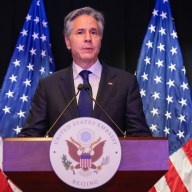SEOUL, South Korea – The ballistic missiles that North Korea test-fired this weekend were likely capable of striking key government and military facilities in South Korea, a defence official said Sunday, amid growing concerns over Pyongyang’s firepower.
North Korean state media did not mention the launches but boasted that the country’s military could impose “merciless punishment” on those who provoke it.
Pyongyang launched seven missiles into waters off its east coast Saturday in a show of force that defied U.N. resolutions and drew international condemnation.
The missiles appear to have travelled about 250 miles (400 kilometres), meaning they could have reached almost any point in South Korea, an official at the South Korean Defence Ministry said on condition of anonymity, citing department policy.
The official said the exact details of the launches were still under investigation.
The launches on July 4 appeared to be a poke at Washington as it moves to enforce U.N. as well as its own sanctions against the isolated regime for its May 25 nuclear test.
Adm. Mike Mullen, chairman of the U.S. Joint Chiefs of Staff, warned they were “very destabilizing, potentially.”
But Vice-President Joe Biden indicated the U.S. would not be baited by attacks on the day Americans celebrated independence. On ABC, he described the flurry of rockets as “attention-seeking behaviour.”
He added: “I don’t want to give the attention.”
U.N. Secretary-General Ban Ki-moon said he is concerned about the missile tests, which defied Security Council resolutions. He told reporters Sunday that North Korea’s communist regime has closed all doors to communication and dialogue.
China’s Deputy Foreign Minister He Yafei told journalists in Rome, ahead of this week’s G-8 summit, his country is supporting U.N. Security Council actions.
“The U.N. Security Council has adopted a resolution to take action” against North Korea “while leaving room for diplomatic relations,” He said. “China will support that resolution. We believe that the six-party talks is the right path.”
“We will encourage Japan to use its influence to start talking about a peaceful solution,” He said at a briefing ahead of this week’s G-8 summit in Italy.
Swedish Foreign Minister Carl Bildt, whose government assumed the rotating European Union presidency on July 1, also condemned the launches, calling the move “a conscious political provocation.”
North and South Korea, which fought a 1950-53 war, still face off across the world’s most heavily fortified border. The United States, South Korea’s key ally, has 28,500 troops stationed in the country as a deterrent.
The North’s main Rodong Sinmun newspaper said in a commentary that “our revolutionary forces have grown up today as the strong army that can impose merciless punishment against those who offend us,” crediting the country’s “military first” policy.
The commentary was carried Sunday by the official Korean Central News Agency.
North Korean leader Kim Jong Il has been devoting much of the country’s scarce resources to his 1.2 million-member military under the policy.
South Korea’s Yonhap news agency – citing a government source it did not identify – reported that five of the seven ballistic missiles landed in one area, indicating their accuracy has improved.
Yonhap said two of the seven missiles launched are believed to be variants of Rodong missiles while the rest are believed to be upgraded versions of Scud-C missiles.
The modified Scud-C versions have a range of up to 370 miles (600 kilometres), which could hit most of South Korea. Rodong missiles, meanwhile, have a range of up to 800 miles (1,300 kilometres), putting most parts of Japan within striking distance.
Yonhap said, however, that the range of the Rodong missiles launched Saturday had been reduced apparently to improve accuracy.
The agency also said the North is believed to have many Scud missiles positioned near the border with South Korea, capable of reaching the Seoul metropolitan area within four to six minutes.
Another South Korean Defence Ministry official said no signs of additional missile launches had been detected, but more were possible given North Korea warned ships to stay away from the area through July 10. He also spoke on condition of anonymity citing department policy.
The North has engaged in a series of acts this year widely seen as provocative. It fired a long-range rocket it said was a satellite in early April, and in late May it carried out its second underground nuclear test following the first in late 2006.
Last month, it appeared to flout new U.N. sanctions again when a ship believed to be carrying illegal weapons set sail. Yonhap said Sunday, however, that the boat, which turned around a week ago, is now headed toward Korean waters.
Koh Yu-hwan, a North Korea expert at Seoul’s Dongguk University, predicted Pyongyang would now spend some time watching how the international community reacts to the launches.
“There will be a cooling off period for the time being,” he said.
–
Associated Press writer Louise Nordstrom in Stockholm contributed to this report.
















